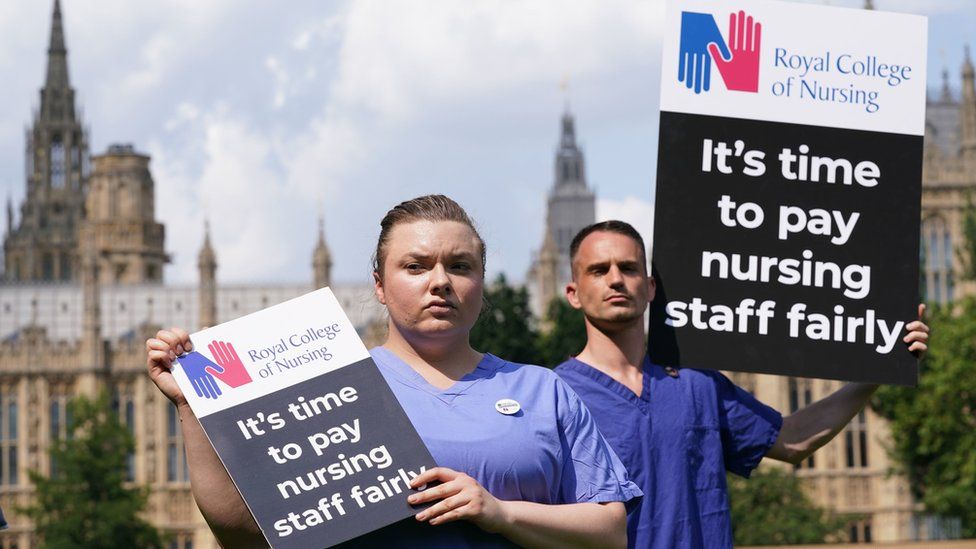ARTICLE AD BOX
 Image source, PA Media
Image source, PA Media
Talks to avert strike action by nurses have failed, with the union accusing the health secretary of "belligerence".
The head of the Royal College of Nursing (RCN), Pat Cullen, said strikes in England, Wales and Northern Ireland would now go ahead on Thursday, after Steve Barclay refused to discuss pay.
The government said it would continue to engage on non-pay related issues.
The union is calling for a pay rise of 19.2% but ministers say this is unaffordable.
The Department of Health said Mr Barclay had "again listened to the RCN's position on pay and reiterated the government has agreed to the recommendations of the independent pay review body".
A spokesperson said the health secretary had told Ms Cullen that any further pay increase would mean taking money away from frontline services and tackling the post-Covid backlog.
Ms Cullen said she was "extremely disappointed at the belligerence shown" in a meeting with the health secretary earlier.
She said pay was "fundamental" to the dispute and not discussing it was "nothing short of being disrespectful to our profession".
Ms Cullen had said she was "optimistic" ahead of the meeting but "they closed their books and walked away from the nursing profession this afternoon".
"We haven't come out with one single brown penny," she added.
The union leader has previously said the strikes could be paused if the health secretary "seriously" negotiated over pay.
The RCN has also failed to reach an agreement with the Welsh government, which said it could not make an increased pay offer without additional funding from the UK government or risking a reduction in services.
More walkouts are planned for 20 December.
RCN members in Northern Ireland are also part of the strike action. Health sector workers from Unison, Nipsa and GMB in Northern Ireland have already been striking this week over pay and conditions.
The union is calling for a pay rise of 5% above the RPI inflation rate, which in October was 14.2%, but no UK nation has offered close to that.
The RCN says its pay demands follow years of squeezes on nurses' salaries, which have not kept up with the rising cost of living.
Shadow health secretary Wes Streeting said a Labour government would not be able to afford such a rise but added that it "would be willing to meet and negotiate" to avoid a strike.
He accused ministers of a "stubborn refusal to engage" and of blaming NHS staff for the challenges "that are the direct fault and responsibility of 12 years of Conservative mismanagement".
Meanwhile, in Scotland, members of two major NHS unions, Unite and Unison, have voted to accept an improved pay offer, averaging 7.5%.
However, ballots of GMB, Chartered Society of Physiotherapy and RCN members in Scotland are ongoing.
Watch: Labour would not give nurses a 19% pay rise
The country is facing a wave of strikes this month, including from paramedics, rail workers, and Border Force staff.
Unions are calling for bigger pay increases to help their members cope with rising prices, but the government has warned this could make inflation worse.
Earlier, ministers and civil servants held an emergency Cobra meeting to discuss contingency plans for the upcoming industrial action, including using the military to cover Border Force staff.
Armed forces will also be sent to hospital trusts to familiarise themselves with vehicles ahead of an ambulance worker strike in England and Wales on 21 and 28 December.
Downing Street has warned there will still be "serious disruption".
Cabinet Office minister Oliver Dowden, who chaired the meeting, urged unions to call off the strikes.
He said ministers were "straining every sinew" to minimise the risks from walkouts but it would never be able to eliminate them.

 2 years ago
18
2 years ago
18








 English (US) ·
English (US) ·